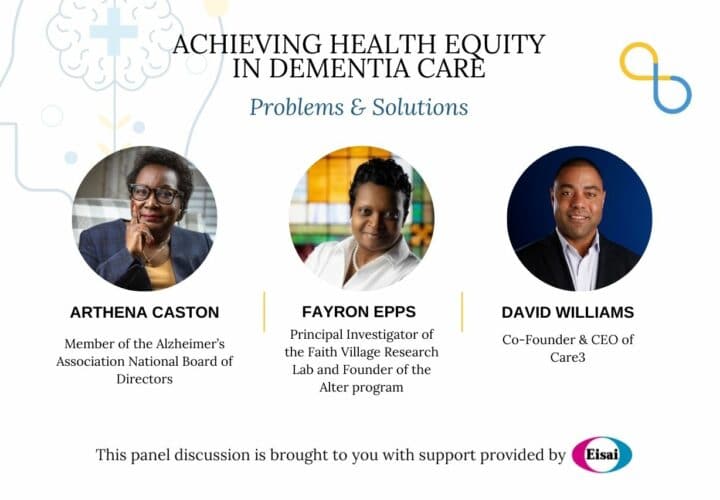Neurologist Lenora Higginbotham in Atlanta shares how her grandmother’s Parkinson’s journey inspired her present-day career in neurology.
This article is part of the series Diversity & Dementia, produced by Being Patient with support provided by Eisai.
Dr. Lenora Higginbotham was interested in neuroscience as early as her teenage years. Her mother was a medical librarian and two of her aunts were physicians, so the medical world was familiar to her, but she worried that she did not have the right personality to become a doctor herself.
“I thought maybe I need to be more confident, more headstrong, less doubtful,” Higginbotham told Being Patient. “ I also worried about the weight of making medical decisions and how that would impact me.”
She decided to pursue the sciences in college, believing she would eventually land in research. But eventually, Higginbotham pushed past her self-doubt and entered the Emory University School of Medicine. Today, she is an assistant professor of neurology at her alma mater, Emory, in Atlanta, with a focus on dementia treatment.
Her research at the Emory Alzheimer’s Disease Research Center focuses mainly on protein biomarkers for dementia, where, because of the racial disparities in dementia risk, she works to help diversify dementia research and to recruit more people of color to participate in studies.
Although taking part in a neurology rotation helped fuel her pre-existing interest in the speciality, it was her personal life that inspired her to commit to the field and to specialize in Lewy Body dementia. While Higginbotham was in medical school, her grandmother, Ruby, was going through a particularly rough patch in her battle with Parkinson’s Disease. The two had always been very close, Higginbotham said.
“I was pretty involved with her care, with going to visits,” Higginbotham told Being Patient. “I think undergoing that process was really a big inspiration to go into the field that I am in now.”
Ruby may have first started showing symptoms in her 70s, according to Higginbotham, but she was not properly diagnosed with Parkinson’s until she was in her 80s. Higginbotham remembers that when she was in high school, her grandmother started to move very slowly, and would take an unusually long time to get up in the morning, even for an older woman, sometimes joking with family members visiting her home in New Orleans that they would need to count to 10 before she was able to get up.
Higginbotham even remembers her grandmother, at one point, needing to tell her foot to move before she was able to physically do so, she said. But for years, Ruby’s family attributed her stiffness and slow pace to arthritis, two knee replacements and a past car accident.
After Hurricane Katrina hit New Orleans in 2005, Ruby moved to Atlanta to live with a daughter. There, her condition started to worsen. Ruby started to lose some motor function and over time she began to show signs of dementia, according to Higginbotham: She experienced hallucinations, anxiety and sometimes suffered bouts of confusion.
By the time Higginbotham was in college, Ruby was regularly seeing a geriatrician who recommended that she take the Levodopa, a potent Parkinson’s medication.
The medication created a “dramatic improvement” in Ruby’s stiffness, Higginbotham recalled, and this confirmed to the family that she did indeed have the illness. But the medication could only do so much. Eventually, Ruby moved into an assisted living facility in Atlanta where, unfortunately, Higginbotham said, attentive care was more difficult to come by.
“Getting care [at the facility] was difficult, especially if you are not very mobile,” Higginbotham said. One of the most striking memories she has of that time was a major hospitalization Ruby endured between Higginbotham’s second and third year of medical school.
According to Higginbotham, Ruby had somehow become severely dehydrated at her assisted living facility and was sent to a hospital to receive care. Higginbotham visited the hospital and found her grandmother in a disturbing state.
“I remember going there and she was just fighting, trying to bite people. She was just very, very delirious,” Higginbotham said of Ruby’s state, which is not uncommon for dementia patients who spend time in the intensive care unit.
“She would reach out for things that were not there,” Higginbotham recalled. “It was just very difficult to see your grandmother like that.”
As physicians worked to stabilize Ruby, Higginbotham ended up learning the hard way how much a physician’s bedside manner can impact patient care. At one point during Ruby’s hospitalization, physicians said that she would need a feeding tube, Higginbotham recalls, vehemently advocating for this course of treatment despite pushback from Ruby’s family.
“I remember talking with my aunt and we had never really spoken to her [Ruby] about how aggressive she would want her care to be, but we both determined that that was not something she would want,” Higginbotham said.
“They were a little pushy about the PEG,” she said of the insertion of a PEG (percutaneous endoscopic gastrostomy) feeding tube, which physicians have recommended against, at least for patients in later stages dementia. “I kind of vowed to myself I would never be like that.”
Physicians eventually decided to move Ruby from a private recovery room to a floor with other patients living with dementia. Here, Higginbotham learned another tough lesson about the healthcare system. Due to the number of patients, she said, the floor was constantly noisy, and she felt that hospital staff were never able to give proper or speedy care to everyone.
“Hospitals and in-patient rehabs are just not built for dementia patients,” Higginbotham says, noting that especially for patients with dementia, hospital stays can be disorienting and distressing.
Higginbotham carries the lessons from that particular hospitalization with her every day, and now, as a practicing physician, she works with her patients’ families to ensure they are informed about treatments, care and the realities of hospitalizing a person with Parkinson’s or other forms of dementia.
This experience with Ruby, and what homecare alternatives her family might have been able to provide at the time, inform “a lot of what I think about before I advise my patients to go to a hospital,” Higginbotham said.
“I often think about my grandmother and think about ways we can help prepare families and [hold families’ hands] through this time,” she added, with the goal of avoiding “major setbacks or putting patients in environments that are not friendly to their needs.”



